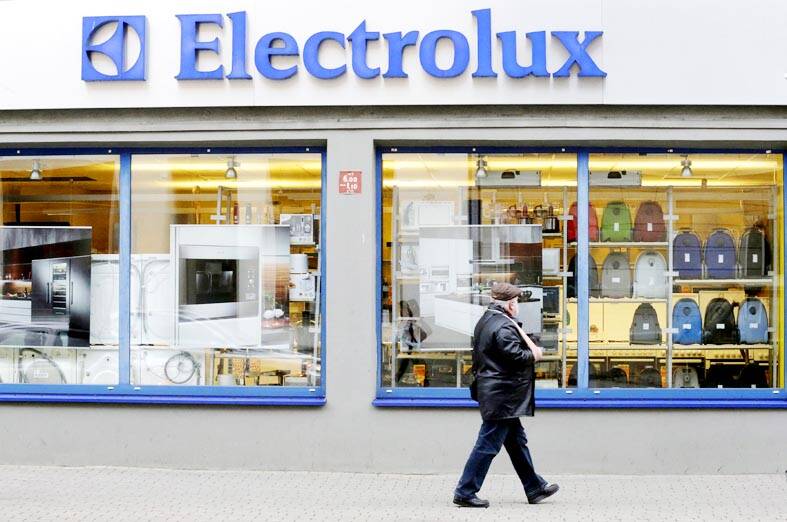Midea Group Co (美的集團) is exploring a potential acquisition of Electrolux AB, people familiar with the matter said, a bold move by the Chinese home appliance giant to add the higher-end luxury Swedish brand despite potential political opposition.
Midea made a preliminary approach in the past few weeks to the white-goods manufacturer about a possible transaction, said the people, who asked not to be identified because discussions are private.
Electrolux has so far not been receptive to the proposal, some of the people said.

Photo: Reuters
Midea has been interested in Electrolux for some time and would only want a friendly deal, the people said.
Other Asian appliance makers including Samsung Electronics Co have also looked at the Swedish business, they added.
Stockholm-based Electrolux’s B shares rose almost 16 percent on Friday on better-than-expected earnings, giving it a market capitalization of US$4.3 billion. Midea shares are up about 10 percent this year, valuing it about US$58 billion.
The deal would test the Chinese company’s ability to make foreign acquisitions amid growing protectionist measures in Europe and the US, even if dishwashers and refrigerators would not necessarily be deemed a national security risk.
Buying Electrolux would add to previous overseas acquisitions by Midea. The company, which is based in Guangdong Province’s Foshan, bought a controlling stake in Toshiba Corp’s home appliance unit in 2016. It acquired German robot maker Kuka AG a year later, which triggered concerns in the German government.
Midea chairman Paul Fang (方洪波) hinted at interest in acquisitions in the US and Europe in 2017 after the firm participated in the bidding for General Electric Co’s white goods unit, which was sold to Chinese competitor Haier Group (海爾集團). Turkey’s Arcelik AS, which completed a European deal with Whirlpool Corp this year, is also a competitor.
Midea and Electrolux already have some partnerships, and in 2018 they launched the high-end AEG brand in China.
A spokesperson for Electrolux declined to comment, while representatives for Midea and Samsung could not be immediately reached for comment outside usual business hours.
Key to any deal would be getting the support from the billionaire Wallenberg family’s Investor AB, the biggest shareholder in Electrolux. There was speculation in February about Midea’s potential interest.
Electrolux is laying off 3,800 workers as it seeks to cut costs and turn around its North American business. It reported first-quarter earnings that were better than expected overall, but still showed a net loss, with analysts pointing to negative cash flow.
Midea’s net income in the first quarter increased 12 percent year-on-year to 8 billion yuan (US$1.16 billion), the company said on Friday.
It also reported net income of 29.6 billion yuan last year, missing analyst estimates.

Intel Corp chief executive officer Lip-Bu Tan (陳立武) is expected to meet with Taiwanese suppliers next month in conjunction with the opening of the Computex Taipei trade show, supply chain sources said on Monday. The visit, the first for Tan to Taiwan since assuming his new post last month, would be aimed at enhancing Intel’s ties with suppliers in Taiwan as he attempts to help turn around the struggling US chipmaker, the sources said. Tan is to hold a banquet to celebrate Intel’s 40-year presence in Taiwan before Computex opens on May 20 and invite dozens of Taiwanese suppliers to exchange views

Application-specific integrated circuit designer Faraday Technology Corp (智原) yesterday said that although revenue this quarter would decline 30 percent from last quarter, it retained its full-year forecast of revenue growth of 100 percent. The company attributed the quarterly drop to a slowdown in customers’ production of chips using Faraday’s advanced packaging technology. The company is still confident about its revenue growth this year, given its strong “design-win” — or the projects it won to help customers design their chips, Faraday president Steve Wang (王國雍) told an online earnings conference. “The design-win this year is better than we expected. We believe we will win

Chizuko Kimura has become the first female sushi chef in the world to win a Michelin star, fulfilling a promise she made to her dying husband to continue his legacy. The 54-year-old Japanese chef regained the Michelin star her late husband, Shunei Kimura, won three years ago for their Sushi Shunei restaurant in Paris. For Shunei Kimura, the star was a dream come true. However, the joy was short-lived. He died from cancer just three months later in June 2022. He was 65. The following year, the restaurant in the heart of Montmartre lost its star rating. Chizuko Kimura insisted that the new star is still down

While China’s leaders use their economic and political might to fight US President Donald Trump’s trade war “to the end,” its army of social media soldiers are embarking on a more humorous campaign online. Trump’s tariff blitz has seen Washington and Beijing impose eye-watering duties on imports from the other, fanning a standoff between the economic superpowers that has sparked global recession fears and sent markets into a tailspin. Trump says his policy is a response to years of being “ripped off” by other countries and aims to bring manufacturing to the US, forcing companies to employ US workers. However, China’s online warriors